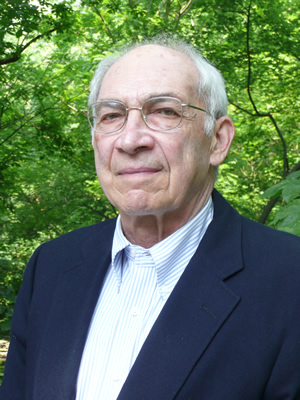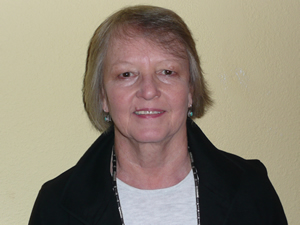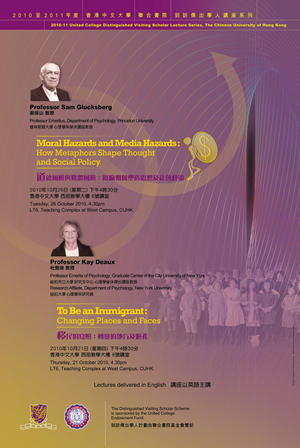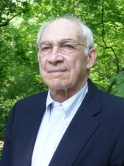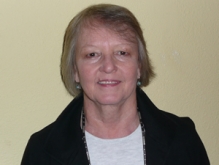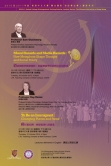CUHK
News Centre
CUHK United College Distinguished Visiting Scholars Give Psychology Lectures on the Choice of Words in Shaping Social Policies and Immigration IssuesPublic Lectures Open for Registration
Professor Sam Glucksberg, Professor Emeritus, Department of Psychology, Princeton University and Professor Kay Deaux, Professor Emerita of Psychology, Graduate Center of the City University of New York, are visiting United College, The Chinese University of Hong Kong (CUHK), from 15 to 30 October 2010 as the College’s Distinguished Visiting Scholars in 2010-11. They will each deliver a public lecture during their visit. Members of the public are welcome to join the lectures, which will be conducted in English. Please call 2609-7455 for reservation and details.
Professor Glucksberg and Professor Deaux is a scholar-couple and are evergreens. Professor Glucksberg obtained his doctoral degree from New York University in 1960, and started his career as a research psychologist in the US Army Human Engineering Laboratories where he worked for three years, before joining Princeton in 1963. In 1970 he became professor and served as the department chair between 1974 and 1980. Highlights of his professional activities include Presidency of the Division of Experimental Psychology, the American Psychological Association; and Editorship of the journals Psychological Science, and Journal of Experimental Psychology: General. Professor Glucksberg is also a renowned teacher, his introductory course in psychology was one of the most popular courses at Princeton, and he co-wrote an influential introductory text with Princeton colleagues.
Professor Deaux obtained her Ph.D. in social science from the University of Texas in 1967, and held professorships at Wright State University, Purdue University, and the City University of New York Graduate Center. She is a social psychologist renowned for her groundbreaking research on two major psychological areas: gender and immigration. While many are embracing the age of globalization, immigration has, in parallel, become a crucial topic of investigation. An understanding of multifaceted psychological experiences of immigrants would have far-reaching consequences, particularly in policy making. Her researches have been supported and published by the Russell Sage Foundation, the principal American Foundation devoted exclusively to research in social sciences. Deaux’s career is her involvement with the American Psychological Society (now the Association for Psychological Science), the premier academic society for advancing scientifically-oriented psychological researches: she was on the Board of Directors from 1993 to 1996, and its President in 1997-98.
Details of the two lectures are as follows:
Professor Deaux: To Be an Immigrant: Changing Places and Faces
Thursday, 21 October 2010, 4:30 p.m.
Venue: LT6, Teaching Complex at Western Campus, CUHK
Professor Glucksberg: Moral Hazards and Media Hazards: How Metaphors Shape Thought and Social Policy
Tuesday, 26 October 2010, 4:30 p.m.
Venue: LT6, Teaching Complex at Western Campus, CUHK
Synopses of the lectures:
To Be an Immigrant: Changing Places and Faces
Immigration is a social issue of global importance. It is changing the demographics of many countries while at the same time posing challenges for governments and citizens of both sending and receiving countries. Recent psychological research explores the conditions of immigration, as they are experienced by the immigrants themselves. Key psychological processes include definitions of ethnic and national group membership, the choice of reference groups to assess one’s standing, the effect of discriminatory treatment on the perception of opportunity and acceptance in society, and decisions to join with others to improve conditions for one’s group. Each of these processes can differ in important ways depending on the ethnicity of the immigrant group in question and can have consequences for both individual and group outcomes. Importantly, the significance of being an immigrant is not eliminated for the second generation, that is, those individuals who are born in the country to which their parents immigrated. How these issues are resolved, both by immigrants and by native-born residents, is critical for the future of society at large.
Moral Hazards and Media Hazards: How Metaphors Shape Thought and Social Policy
All natural languages provide alternative ways to talk about any given referent. For example, an economic recession can be characterized either as an economic mess or as an economic meltdown. This choice of metaphor can have profound effects on policy decisions: messes can be cleaned up, meltdowns require more drastic action.
One metaphor that has endured for decades is “moral hazard”: people or institutions that are insured may take unfair advantage of their insurance. For example, providing fire insurance to a storekeeper may result in the store being burned down for the insurance money. Recently, this metaphor has been applied to large financial institutions. Institutions that are “too large to fail” may take advantage of governments’ commitment to ensure their survival by engaging in risky behaviors. By using this metaphor, we implicitly (and perhaps unconsciously) express disapproval of policies that provide insurance against failure. Furthermore, choice of this metaphor affects how we describe efforts to rescue failing institutions. Are such efforts financial bail-outs or, more neutrally, economic stimulus packages? The moral hazard metaphor may well lead to the financial bail-out metaphor. How we use language can thus have powerful effects on judgment, decision making, reasoning, perception and, ultimately, on policy.
Because such metaphors are ubiquitous in public discourse, including the media, they may well color and shape our views of social and economic issues. In particular, the unintended consequences of choosing one metaphor over another constitute a media hazard: systematic biasing of our views of important social and economic situations and policies.


